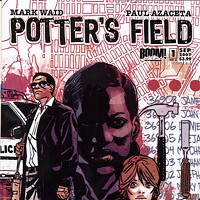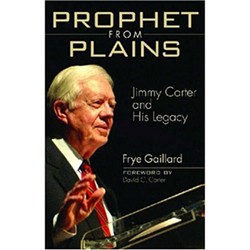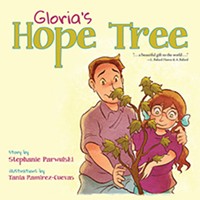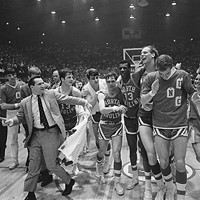The Prickly Peacemaker
Carter's values lead down a bumpy road
How did Jimmy Carter go from presidential mediocrity to internationally respected peacemaker and moral conscience? That's the subject of Frye Gaillard's incisive, insightful new book. Gaillard, a former Charlottean and columnist for Creative Loafing, and now the writer-in-residence in the English and history departments at the University of South Alabama, came of age in the South amid the wrenching changes of the 1960s. It's not surprising, then, that he's spent much of his career reporting on the region. In addition to his books on Southern music, religion and culture, he's also taken a hard look at the region's politicians, examining how those leaders were shaped by the South's history -- and how they've taken what they've learned, if anything, out into the larger world.
When he wrote for the Charlotte Observer, Gaillard was among the first to reflect on Jimmy Carter's post-presidency as an expression of the man's most deeply held beliefs. Gaillard was also among the first to re-examine Carter's troubled, largely unsuccessful presidency.
In Prophet From Plains, Gaillard argues convincingly that, contrary to "conventional wisdom," Carter's failures as a president weren't due to wishy-washiness or indecision. Quite the reverse, says Gaillard. The problem was that Carter was almost too resolute, so sure of his own correctness, even righteousness, he angered or scared off the political allies he desperately needed. It didn't help, either, that he failed to grasp the importance of "marketing" his ideas to the U.S. public.
Gaillard presents a succinct, clear-eyed and nuanced look at Carter's presidency and post-White House life, expanding on and clarifying his view of Carter as a genuinely unique American character, albeit one who's prone to stubbornness and impatience.
The scope of Prophet From Plains stretches from the Panama Canal treaty to the energy crisis, the Iran hostage disaster to the Camp David Accords, and then on to the post-presidency years. The latter part of the book covers Carter's extensive involvement with Habitat For Humanity, as well as his work, through the establishment of the Carter Center in Atlanta, on election monitoring, peace negotiations and disease control.
Throughout his presidency and afterward, Carter's uncompromising stances, particularly when it comes to issues that may tempt him to vary from his Christian values, have been both a strength and a weakness. His tendencies toward stubbornness were never better revealed than recently, after the publication of Prophet, when U.S. news outlets reported on the 83-year-old Carter yelling at a security guard in the Sudan who refused to let him enter a small town. Both Carter's desire to help and his occasional high-handedness, which at times go hand in hand, were on full display.
Accounts in Prophet of Carter's trips to some of the world's most godforsaken areas can make one understand the ex-president's keenness to get things done, however. Many of the scenes Carter has witnessed in these places don't exactly cry out for patience. For instance, Carter and his wife Rosalynn traveled to a village in Ghana in 1988 to investigate an epidemic of guinea worm, a horrific waterborne pestilence in which larvae grow in the human bloodstream. The larvae turn into three-foot worms and secrete an acid by which they burn their way through flesh to reach the surface. As Gaillard recounts it,
Carter [remembered] a beautiful young woman sitting apart from the rest, holding what seemed to be a baby in her arms. Carter and Rosalynn walked over to see her and discovered that what she was holding was not a baby but her breast, massively swollen with a guinea worm slowly emerging from the nipple. "I had to fight back nausea," Carter remembered.
At moments in the book such as that one, Gaillard's take on Carter as a modern variation of the Old Testament prophets -- who were equally uncompromising in their commitment to justice or peace -- seems more than justified. The former president certainly hasn't shied away from rubbing various rulers the wrong way, even when he's accused of being a "meddler" in the eyes of the powerful. In this writer's opinion, it speaks well of Carter that his efforts to mediate conflict, insure free elections, and bring attention to terrible diseases have often angered some national leaders, including U.S. presidents who served in the White House after him. In a real sense, Carter has gone from being the embodiment of power to personifying the concept of "speaking truth to power."
Prophet From Plains, which treats Carter fairly but doesn't flinch from exposing his faults, is a very worthy, and welcome, addition to the literature on the man who, for better or worse (or both), has had one of the most remarkable post-presidencies in U.S. history.
Frye Gaillard will read from and sign copies of Prophet From Plains on Friday, Nov. 2, at 6 p.m. at Park Road Books.
Prophet From Plains by Frye Gaillard
University of Georgia Press, 128 pages, $19.95
Speaking of 5.00000
-
Body Talk
Dec 12, 2007 -

What If the Water Runs Out?
Dec 12, 2007 -

Comic Proportions
Dec 12, 2007 - More »
Latest in Books
Calendar
-
I've Had It: Hot S**t Tour @ N.C. Music Factory
-

Open Mic Comedy Nights with Craig Collin @ Carolina Beer Temple.
-

NEW WINDOW GALLERY-Pat Rhea-ACRYLIC PAINTINGS-April 05-30 2024 VALDESE, NC 28690 @ New Window Gallery/Play It Again Records
- Through April 30, 12 p.m.
-
Derek Hough - Symphony Of Dance @ Ovens Auditorium
-

"Blood Residue Analysis of Paleoamerican Stone Tools in the Carolinas" @ Native American Studies Center
- Fri., April 26, 12-1 p.m.












